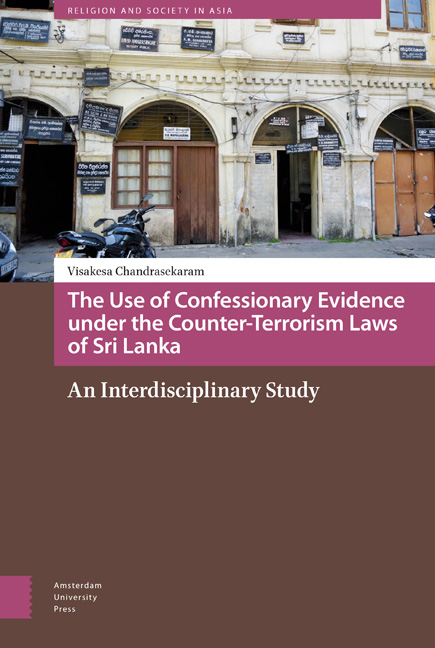 Use of Confessionary Evidence under the Counter-Terrorism Laws of Sri Lanka
Use of Confessionary Evidence under the Counter-Terrorism Laws of Sri Lanka Book contents
- Frontmatter
- Dedication
- Contents
- 1 Do Tigers Confess?
- 2 Rebellion and Martyrdom
- 3 Facts, Falsities, and Fictions
- 4 Punitive Interrogation of Tamil Tiger Suspects
- 5 Judgement of the Terrorist Against the ‘Formula of Justice’
- 6 Fantasies, Fictions, Myths, and Denials about Tamil Tigers’ Confessions
- Appendix
- Acronyms
- Acknowledgements
- About the author
- Bibliography
- Index
6 - Fantasies, Fictions, Myths, and Denials about Tamil Tigers’ Confessions
Published online by Cambridge University Press: 10 December 2020
- Frontmatter
- Dedication
- Contents
- 1 Do Tigers Confess?
- 2 Rebellion and Martyrdom
- 3 Facts, Falsities, and Fictions
- 4 Punitive Interrogation of Tamil Tiger Suspects
- 5 Judgement of the Terrorist Against the ‘Formula of Justice’
- 6 Fantasies, Fictions, Myths, and Denials about Tamil Tigers’ Confessions
- Appendix
- Acronyms
- Acknowledgements
- About the author
- Bibliography
- Index
Summary
The confession transcends all other evidence as it ranks as the most influential of all forms of evidence that may be submitted in a criminal case. As the confession is provided by the defendant him/herself who has the ultimate authority to pronounce his/her crime, it is believed to carry the ‘best evidence’ on the suspect's mental state and best proof of criminal intention or mens rea. Deconstructing the confessionary narratives of Tamil Tigers in this research, the reliability and validity of the confession were questioned. Further, competing versions of the narratives were presented, challenging the truthfulness and the evidentiary value of the Tigers’ confessions. Based on this analysis, a number of propositions were presented: that the confessions derive from institutional fantasies of victory at war, that they carry fictions rather than factual accounts, that they reinforce the myths that tortured suspects tell the truth, and that the state, including the judiciary, is in denial about the persecutory practices used within the justice system to determine the ‘truth’ of these confessions. One of the key objectives of this chapter is to revisit these propositions in light of the broader discourse on the war against terrorism. This exercise can be commenced with a discussion on the military and political upheavals that have dramatically changed the landscape of the Sri Lankan ethnic conflict. Retracing the intended outcomes of the state's mass prosecution strategy, we can then consider whether the state has achieved its goals. Next the core themes presented in the previous chapters will be recapitulated, followed by a summary of the empirical findings. Finally, the likely future of confessionary evidence in the criminal justice system in Sri Lanka will be briefly considered.
End of the Tamil Tigers’ era
When this research project began in 2006, the LTTE was at the peak of its power, controlling nearly one-third of the territories of Sri Lanka. As many previous attempts to defeat them had been futile, the then UNP Government resorted to striking a peace deal, which lasted for five years (2001-2006), and saved many thousands of lives. A segment of the Sinhalese population still believed that the Tigers should be defeated on the battleground, but most reluctantly admitted that this might not be possible.
- Type
- Chapter
- Information
- Use of Confessionary Evidence under the Counter-Terrorism Laws of Sri LankaAn Interdisciplinary Study, pp. 185 - 200Publisher: Amsterdam University PressPrint publication year: 2017


